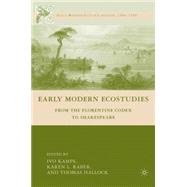
What is included with this book?
Thomas Hallock is Assistant Professor of English at University of South Florida, St. Petersburg.
Ivo Kamps is a Professor of English at the University of Mississippi.
Karen Raber is a Professor of English at the University of Mississippi.
| List of Illustrations | p. vii |
| Series Editor's Preface | p. ix |
| List of Contributors | p. xi |
| Introduction: Early Modern Ecostudies | p. 1 |
| Ecocriticism and Early Modern Europe: New Approaches, Maturing Disciplines | |
| Slow Shakespeare: An Eco-Critique of "Method" in Early Modern Literary Studies | p. 11 |
| Mute Timber?: Fiscal Forestry and Environmental Stichomythia in the Old Arcadia | p. 31 |
| Defining Nature through Monstrosity in Othello and Macheth | p. 55 |
| Doing Ecocriticism with Shakespeare | p. 77 |
| How to Do Things with Animals: Thoughts on/with the Early Modern Cat | p. 93 |
| Utopian Ecocriticism: Naturalizing Nature in Thomas More's Utopia | p. 115 |
| Summer's Lease: Shakespeare in the Little Ice Age | p. 131 |
| The Spirit and the Flesh: The Implications of Religion for Early Modern Nature | |
| Anima-tion at Little Gidding: Thoughtful Inconsistency as Ecological Ethos in an Early Modern Bible Harmony | p. 145 |
| An Ecocritical Evaluation of Book XI of the Florentine Codex | p. 167 |
| Meditation on the Creatures: Ecoliterary Uses of an Ancient Tradition | p. 181 |
| The Pomology of Eden: Apple Culture and Early New England Poetry | p. 193 |
| Nature and Empire | |
| Delight Is a Slave to Dominion: Awakening to Empire with Richard Ligon's History | p. 219 |
| "The Archeologists Made Observations That Conjured Up Interesting Mental Pictures": De Soto, Narrative Scholarship, and Place | p. 235 |
| Imagining the Forest: Longleaf Pine Ecosystems in Spanish and English Writings of the Southeast, 1542-1709 | p. 251 |
| Would Thomas More Have Wanted to Go to Mars? Colonial Promotion and Bio-Power | p. 269 |
| Index | p. 291 |
| Table of Contents provided by Ingram. All Rights Reserved. |
The New copy of this book will include any supplemental materials advertised. Please check the title of the book to determine if it should include any access cards, study guides, lab manuals, CDs, etc.
The Used, Rental and eBook copies of this book are not guaranteed to include any supplemental materials. Typically, only the book itself is included. This is true even if the title states it includes any access cards, study guides, lab manuals, CDs, etc.